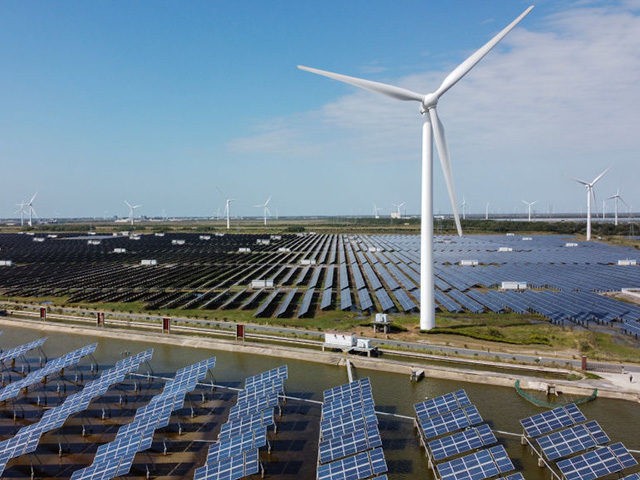Uyghurs and other ethnic minorities employed by solar panel plants in China’s western region of Xinjiang are working “of their own will” and paid a competitive salary China’s state-run Global Times claimed Thursday, refuting recent reports from Western media outlets and think tanks alleging the minorities operate under slave labor conditions.
“All of our employees are working here out of their own will, to earn more money, to better their parents’ lives, or to provide better education to their children,” Xu Xiaoyuan, the head of human resources at Xinjiang Daqo, a raw materials producer for solar panels in Xinjiang, told the Global Times recently.
Xu said “the first word that came to her mind was ‘fallacy’ when she heard how some foreign media had linked Xinjiang’s polysilicon producers to the alleged ‘forced labor,'” according to the newspaper. Polysilicon is a raw material used in the manufacture of solar panels.
Global Times reporters recently visited “Xinjiang Daqo,” which is short for “Xinjiang Daqo New Energy,” for an April 29 report on Xinjiang labor conditions. The New York Times published a report on January 8 explicitly linking Uyghur “forced labor” to Xinjiang-based solar panel plants, including the Chinese-owned “Xinjiang Daqo New Energy.”
Citing a report by Horizon Advisory, a consultancy specializing in Chinese-language research, the newspaper wrote that “major solar companies including GCL-Poly, East Hope Group, Daqo New Energy, Xinte Energy, and Jinko Solar are named in the report as bearing signs of using some forced labor.”
“While many details remain unclear, those signs include accepting workers transferred with the help of the Chinese government from certain parts of Xinjiang, and having laborers undergo ‘military-style’ training that may be aimed at instilling loyalty to China and the Communist Party,” according to the Times.
Xinjiang Daqo HR head Xu Xiaoyuan refuted the slave labor allegations to the Global Times, telling the newspaper that the company “recruits employees through online platforms, from universities and colleges, job fairs, and through employee referrals.”
“Benefit package includes paid annual leave, two annual home visits with paid travel expenses, 1,000 yuan wedding gift, year-end bonus worth almost two months’ salary and holiday gifts [sic],” Xu said.
Staff at Xinjiang Daqo told the Global Times the company’s “employee turnover rate is less than 3 percent each year, and any worker is free to leave if they want.”
“Every worker whom the reporters spoke with conformed the policy [sic],” the newspaper claimed.
“In early 2017, Chinese authorities began using extralegal detention against Uighur Muslims and other minorities, including Kazakhs, in internment camps” in Xinjiang, the Financial Times reported in December 2018. Researchers and Western media began reporting in late 2018 that the concentration camps, referred to by Beijing as “job training” or “political education” facilities, “put detainees on factory production lines [amounting] to free or low-cost forced labor systems,” the Center for Strategic and International Studies (CSIS), a U.S.-based think tank, recalled on April 19 while reporting on China’s alleged use of Uyghur slave labor at Xinjiang solar panel plants.
U.S. President Joe Biden’s administration has vowed to make the U.S. less reliant on fossil fuels, offering solar energy as an alternative to coal and natural gas. Biden’s administration set a goal on March 25 to decrease the cost of solar energy in the U.S. by 60 percent over the next decade “as part of an ambitious plan to decarbonize the United States’ power sector by 2035,” Reuters reported. The administration also pledged $128 million in funding to support this goal.
“Lowering the cost of solar energy is essential to accelerating deployment and achieving President Biden’s goal of a 100 percent clean electricity grid by 2035. To reach that goal in the next 15 years, hundreds of gigawatts of solar energy need to be installed as much as five times faster than it is now,” The U.S. Department of Energy (DOE) said of the initiative.
The $128 million investment will fund “technologies including perovskite solar cells, which are regarded as a promising cheap alternative to the silicon cells that dominate the market. Funds will also support research on cadmium telluride and concentrating solar technologies,” Reuters reported at the time.
“Part of the funding will also seek to extend the lifetime of existing photovoltaic solar plants by improving components like inverters, cables, and racks,” the news agency added.
While President Biden continues to push for increased solar panel technology in the U.S. as part of a “clean energy” agenda, his administration has failed so far to address the mounting reports and evidence that polysilicon factories in Xinjiang, which produce the raw material polysilicon for use in solar panels, are linked to slave labor.
“Xinjiang, with some of the cheapest power in China thanks to local abundance of coal, has become home to four of the five largest polysilicon factories in the world,” CSIS reported on April 19.
“Between 2010 and 2020, China’s share of global polysilicon production increased from 26 percent to 82 percent, while the U.S. share decreased from 35 percent to 5 percent,” according to CSIS.
“Nearly every silicon-based solar module — at least 95 percent of the market — is likely to have some Xinjiang silicon in it,” Jenny Chase, head of solar analysis at Bloomberg New Energy Finance, said in February.

COMMENTS
Please let us know if you're having issues with commenting.